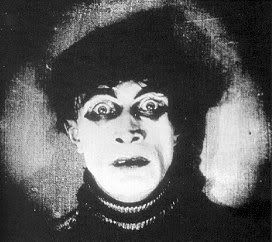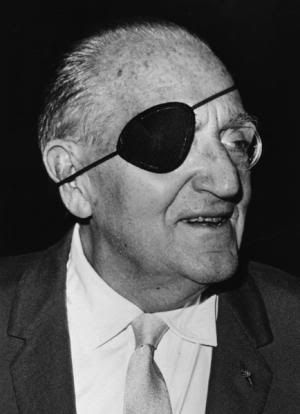Early in his career, Lang acted as well as directed. For a short while, his breakout role as the best friend in "The Cabinet of Dr. Caligari" brought him more fame than his directing credits. Mobbed by paparazzi and disgruntled that the press focused on his acting work while neglecting his serious directing credits such as "Die Spinnen" (a docudrama about the plight of wool-workers in rural Austria), Lang vowed never to appear on-screen again, a vow which he would keep to his dying day. He asked insiders at Ufa to secretly replace his acting credits in previous films with the names of other, lesser-known actors, and refused to speak to the press again until the release of his first true masterpiece, "Der Letzte Mann."

Lang's expressive acting in "The Cabinet of Dr. Caligari" won him considerable fame.
[Description: A man in heavy eye-makeup and disheveled hair looks wide-eyed at the camera.]
Lang's career rose like a rocket throughout the 1920s, bringing great pride to all of Germany. In 1928, with his futuristic magnum opus, "Metropolis," he caught the eye of the National Socialist German Workers' Party (aka "the Nazis"). The Nazis were amazed at the glorious sets and effects in "Metropolis" and thought Lang had mystical abilities. Through their representative, Johann Goebbels, they approached Lang for a secret meeting and asked him to use his powers for evil. Goebbels, knowing Lang's two passions were directorial fame and oysters, even offered Lang the position of Supreme Film Minister and all the bivalves he could eat. Lang, who to that point had remained seated and utterly still throughout the interview, then unfolded his full seven foot, two inch frame and declared, "Never will I sully my art with the foul taint of politics!" He then spat in Goebbels' eye, turned on his heel, and stormed out of the Rijksmuseum.
It was then that Lang's life took a grave turn: infuriated with Goebbels' insulting offer and disgusted by Nazi policies, he teamed up with the Übermensch, Dr. Mabuse, whose powers of mental agility and persuasion made him a valuable ally. Together, they fought crime across Germany, foiling their enemies' plans and restoring hope to the German people. It was only when Dr. Mabuse turned to crime, swayed by another overture by Goebbels, that their partnership came to an end. Goebbels offered Dr. Mabuse the opportunity to rule all of Europe as the head of the Nazi Party; Mabuse, whose dedication to freedom and justice had never been quite as strong as Lang's, accepted the offer. Lang was now forced to cease his disruption of the Nazi Party as a whole in order to take down his old friend and mentor before he could cause terror and suffering to Europe, perhaps even the entire world.
Broken in body and spirit after an epic battle, the details of which are lost to posterity, Lang took three years off from filmmaking in order to recover. When he returned to directing, his first act was to produce a film about his former partner. Both an homage and a condemnation of Mabuse's decline into evil, "M" was a hit at the box office, but was quickly banned in Germany because of its anti-Nazi message. Hitler, the new leader of the Nazi Party, was especially incensed at the use of Nazi-like slogans in the screen-Mabuse's lines, and additionally was convinced that references to "the Empire of Crime" in the movie referred to the Guild of Furriers, whose high prices had been the cause of riots in Austria some twenty years ago. Hitler came from a long line of furriers and was extremely sensitive to any negative references towards them in popular entertainment.
Yet Hitler was also intrigued by Lang's genius when he saw a print of "Metropolis" for the first time. "He knew that with an army of Machine Men, he could swiftly conquer all of Europe and succeed where Dr. Mabuse had not," an aide later recalled. Hitler, fearing to use force because of Lang's tremendous physical strength, made friendly overtures to the filmmaker in an attempt to persuade him to give the Nazis the secret of making Machine Men like the ones in the film; Lang, still recovering from his earlier struggles with Mabuse and the Nazis, opted to use cunning and diplomacy rather than refusing Hitler outright. Telling Hitler that he would have to review his shooting script in order to recall a crucial step in the creation of Machine Men, Lang went home, packed his favorite Expressionist paintings, his best monocle, his finest directing pants, and his only companion, a stuffed monkey named Peter Lorre. With these few belongings, Lang slipped over the border that very night into France and organized the French Resistance.
Although determined to continue fighting the Nazis in Europe for as long as possible, Lang was forced to relocate to the United States in 1935 because of his asthma. It would turn out to be the most important move of his career. He quickly found work in Hollywood creating films noir which hinted at the growing menace of totalitarianism in Europe: movies like "The Philadelphia Story" and "The Awful Truth," which contained carefully-layered metaphors about the terrors of Nazism. Unfortunately, these movies did not go over well with the American public, who wanted lighthearted viewing. Lang was declared box-office poison. He humbly sought assistance from Louis B. Mayer, head of MGM, who suggested that Lang turn his attention to comedies instead. Lang then went on to make "Fury" and "The Big Heat," a two-part series in which a hilariously mismatched pair of newlyweds, the Fredersons, are forced to resolve their differences because their loud squabbles upset their neighbors ("Fury"), and then cope with a terrible heatwave by going to the beach ("The Big Heat"). Hijinks ensued, and the American public turned out in droves for the films. Lang's reputation as a great director was reaffirmed.
It was during his years in America that Lang adopted the moniker "Fritz," in response to his studio's insistence that his full German name would be too lengthy and confusing for moviegoers. Unfortunately, Lang's unusual mannerisms and abrupt mode of speech would not find the same acceptance in Hollywood circles that they did in free-and-easy Nazi Germany; Lang's habit of meditating for days in a closed box, for instance, without food or water, frightened away a succession of household servants and caused nervous speculation among the film community, who were afraid that the prescient abilities granted Lang during his "slumbers" would allow him access to their deepest secrets. Fearing blackmail, they ignored Lang's protests that his meditations merely helped provide him with new ideas for movies, and Lang was effectively blacklisted from American filmmaking.
Becoming old before his time, Lang was increasingly reclusive and refused contact with outsiders. It was only a young French upstart, Jean-Luc Godard, who was able to finally encourage Fritz Lang to emerge from his shell. Godard, who had tracked down the secret of Lang's early acting work and admired his film presence, begged Fritz Lang to appear in his new movie, "Contempt." Lang, however, took his earlier vow to never again appear on film very seriously, and initially refused his young friend's request. Finally, he acquiesced, but on one condition: Lang would speak on film for Godard, but the director could only show a still photo of Lang during the relevant scenes. Godard agreed, and "Contempt" opened to rave reviews.
Despite a brief resurgence of fame in the wake of "Contempt," Lang's fortunes continued to decline. Still full of vigor, if not wealthy, he opted to take to the high seas and try his fortunes as a pirate.

Lang in his final years, after great success in piracy.
[Description: A photo of Fritz Lang, very elderly, smiling, with an eyepatch and a monocle.]
Piracy was good for Lang, and the air quality on the open seas cleared up his asthma at last. Although he harried a good many merchant ships, he was always known to be exceptionally courteous to any ladies on board, leaving them unmolested and guaranteeing them safe return to the nearest port. Because of this he was known along the Spanish Main as the "pirata do cavalheiro," the gentleman pirate. His buccaneering cost many businessmen their fortunes, and indeed the CEOs of Sony, British Petroleum, and United Artists demanded that the governments of their respective nations intervene and use force to end Lang's career on the high seas, but Lang's past as a great Nazi-fighter and filmmaker made politicians reluctant to attack him. Nevertheless, Lang's piracy caused increasing financial ruin all over the industrialized world, and his swift ship, Die Nibelungen, became a byword for fear in boardrooms everywhere.
In order to solve this growing problem, the great countries of the world gathered to form the United Nations, and decided after lengthy debate to quietly pay off Lang's victims to avoid both scandal and global financial collapse. The only condition was that the payees must agree to never again demand financial recompense for past victimization, and must promise complete silence regarding both the piracy and the payoffs. In this we find the origins of the modern saying, "Don't ask, don't tell."
The date of Lang's death is unknown, and his body was never found. However, it is known that in August of 1976, an immense typhoon off the coast of Normandy intercepted Die Nibelungen, destroying it utterly. Fragments of the ship and the corpses of many crewmembers washed up on nearby beaches, but Lang himself was missing, and continues missing to this day. Although some ignominy is lent his name by illegal activities in his final years, Lang continues to be best remembered as a great director and courageous warrior for freedom.
No comments:
Post a Comment